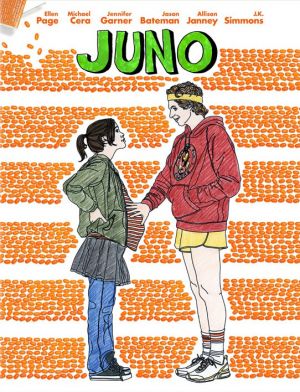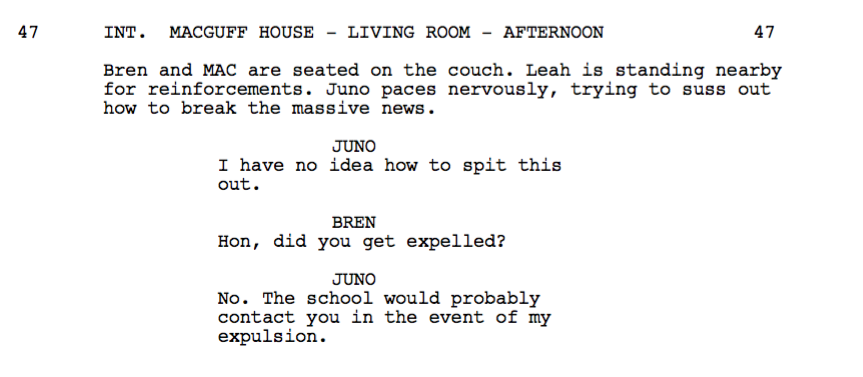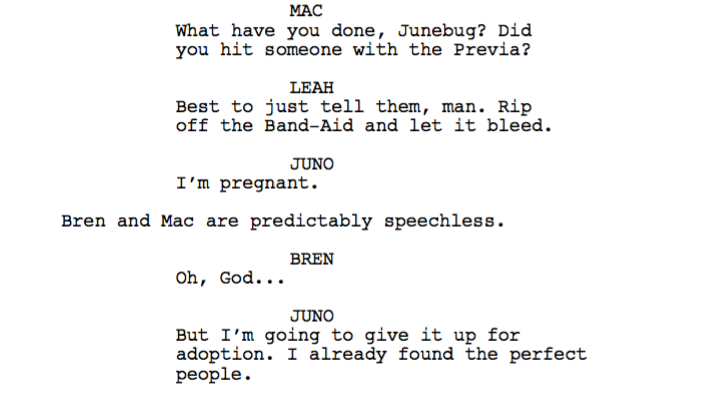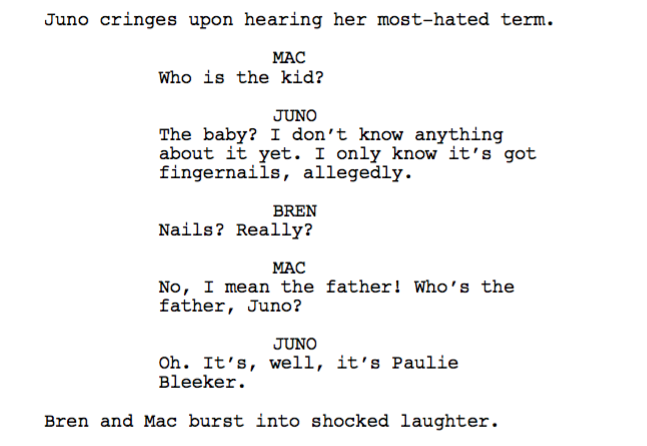Blueprints: "Juno"
 Thursday, December 7, 2017 at 10:00AM
Thursday, December 7, 2017 at 10:00AM This week Juno celebrated its tenth anniversary, so Jorge takes a look at how Diablo Cody’s iconic dialogue was inflicted with meaning by the cast.

Juno first hit theaters ten years ago as a low budget indie hopeful. It ended its run as a major box office hit and Oscar favorite. It was the movie that put Ellen Page on the map, boosted Jason Reitman’s career, and gave us arguably the definitive Jennifer Garner performance.
Screenwriter Diablo Cody won the Oscar for her debut screenplay, and she instantly became a recognizable name, the way many directors but few writers are. And not without merit. One of Juno’s biggest legacy is its quick-witted, snarky dialogue that, many times since then, has tried to be replicated...
But as I discussed in a previous “Blueprints” entry, as great as the dialogue can seem in the page, the real works falls on the actors to convey the emotion behind the words of a scene. Let's explore how a group of actors (especially Page) took Cody’s dialogue in a scene and turned it into an emotional journey.
 Juno
Juno
Written by: Diablo Cody
[You can read the full script here. I will be talking about these pages and this scene.]
Juno has gotten pregnant. She has decided to keep the baby and put it up for adoption. She found the perfect couple. She has told her best friend. She told the father of the child. Now it’s time to tell her parents.
The scene has a very clear arc: one starting point, and one ending point. When it starts, her parents don’t know; by the time it’s over, they do. But Juno has been established as someone who uses clever talk-backs and sarcasm as a way to deflect any real emotion that could befall on her. And right now, emotion is something she can’t avoid.
So Diablo Cody takes a situation that should be a straight path and turns it into an obstacle course. Juno trots in circles around the issue. She asks for mercy. She delivers fast-punchlines as she paces around the room, Ellen Page infusing the emotional wall of this girl with humor and sarcasm.

But her parents press her to reveal what’s happening, and Juno realizes she can’t stretch this any longer. So she confesses that she is pregnant. In the page, this is a very straightforward moment. Just a simple pressing of the Return key, and a new line of dialogue. A simple reveal of information. But on screen, it is anything but.
Ellen page transforms that one line of dialogue (a two-word, ten-character line) and infuses her with the most emotional vulnerability that the character has shown thus far. Tears swell up and her voice breaks. And that emotion lasts as long as that line. As soon as she is through saying that sentence, her defenses are back up, saying how she already has a plan of action. It’s subtle and inspired.

The rest of the scene turns into a back-and-forth between Juno and her parents regarding the father of the baby, her potential abilities as a mother, and the next steps to stake. It’s filled with great one-liners (“He was very good in...chair.”), callbacks to previous scenes (“I only know it’s got fingernails, allegedly.”), and subtle acknowledgments of family support and concern (“I don’t want you to get ripped off by a couple of baby- starved wingnuts.”)
J.K. Simmons and Allison Janney do a great job of taking those lines (whose tone in the screenplay is very open to interpretation and could be played as either threatening, overly distressed, or chastising) and create a nuanced portrayal of a couple that’s concerned and disappointed with a girl that they thought to be too smart for this.

Juno never goes back to the vulnerability of saying “I’m pregnant”, but Diablo Cody sneaks in another line that serves as the thesis for the movie: “I have no idea what kind of girl I am.”
This is a very adolescent sentiment, the confusion of wandering through life not as a child but not yet an adult. Cody takes this feeling and presents its essence in a single scene: a scene of confrontation, of confession, of family distress. But underneath it all, a scene of an aimless teen asking for guidance.
Juno is a smart-ass; she may think she knows everything, she appears to have control over her situation, and she uses her (delightfully crafted) words as a weapon. But she has no idea who she really is.




Reader Comments (14)
I haven't seen Juno in so long I forget how great all the performances are. Obviously Page and Garner get the bulk of the accolades, but J.K. Simmons is incredible. He is in the pantheon of great movie dads.
I love this movie
I've always found it kind of hilarious that many of the people who dislike this film point to this scene to dole out the most common criticism against this movie: that it treats Juno's pregnancy like it's no big deal. Man, do they miss the point! What did they expect Juno's parents to do? Disown her? Kick her out of the house? She's their daughter, she has a problem and they're going to help work through it, that doesn't mean it's not a big deal. Also, Simmons' delivery of "I thought you were the kind of girl who knew when to say when" makes it very clear that this IS a big deal and he's disappointed in her,
I re-watched this one recently and while I do think the dialogue tries too hard at times, it's a beautifully put-together coming-of-age story in which a girl learns to live with how messy life can be at times. Also, Jennifer Garner has never been better (just throwing that out there).
Watching LADY BIRD I couldn't help be reminded by how much I loved JUNO
Great post, Jorge.
"Juno" is one of those movies that if I catch it in the middle when it's on TBS or something, I'll watch it through to the end. Every time I start by trying to clock its alleged tweeness or snark on some Cody lines, and every time it quickly sucks me right in. It's a really strong film and the whole cast is aces. Reitman's best work by far IMO.
Yes, Juno = a fine movie. Def thought of it as an antecedent to Lady Bird (which is even better, as it avoids some of the somewhat calculated "Quirk" that was evident in Juno's first quarter). Ellen Page was so good in the tricky title role, as was the actress playing her best gal pal (what is her name?). The scenes with Jason Bateman and Jennifer Garner were also excellent - they had a real (anti) chemistry going. All-in-all it was a triumph for Diablo Cody, who would craft an even better film in 2011 (Young Adult).
@Rob Olivia Thirlby
She was great too. Hollywood doesn't know what to do with her yet. Hopefully they'll figure it out.
GOD, I love this movie. The entire ensemble is just packed with goodness, and there are the tiniest perfect little grace notes throughout - like in this scene when Simmons and Janney adjust themselves in their chairs ever so slightly before Juno "rip[s] off the bandaid", bracing themselves for what's to come. And the way Simmons looks at her throughout this scene. He just tears a hole right through me. Both he and Garner should have gotten Oscar nominations in addition to Page (who is just fantastic and in any other year probably shoulda/woulda won the Oscar).
You are so right about how the script allows for many possible line readings, giving room for the actors to breathe and craft a character that's unique to them.
"I didn't even know you were sexually active!"
"I didn't know he had it in him."
"I know, right?"
The dialogue was cute, but I think the true achievement in that screenplay was Cody's flawless dramatic structure. She's a master of the classic three act screenplay who stands out because of the wacky hip dialogue.
Page wld hav won the Golden Globe Comedy actress had Cotillard campaigned correctly under Drama. La Vie En Rose is no musical drama! Thank you v much
I like Juno a lot, though (deep breath), I much prefer Jennifer's Body (!!!) and Young Adult.
Well done Ellen for navigating Cody's dialogue successfully - however, I felt like Megan Fox (YES!) and Charlize Theron made full characters of their roles, while Juno still felt a bit "Ellen Page acting and delivering pithy one-liners"...
Seconding the J.K. Simmons love - this is Part 2 of the trilogy that made me fall in love with him (Thank You For Smoking, Juno, Burn After Reading) - true supporting acting at the edges...
Jorge: That bit you say is 10 characters? 13 characters, 10 letters. Characters counts apostrophes, spaces and periods.
one of my favorites